In this article:
People with green thumbs are united in their hatred for weeds and give these rather undesired visitors a collective thumbs-down. Weeds are essentially unwanted plant growths that crop up out of place where they are not sown intentionally.
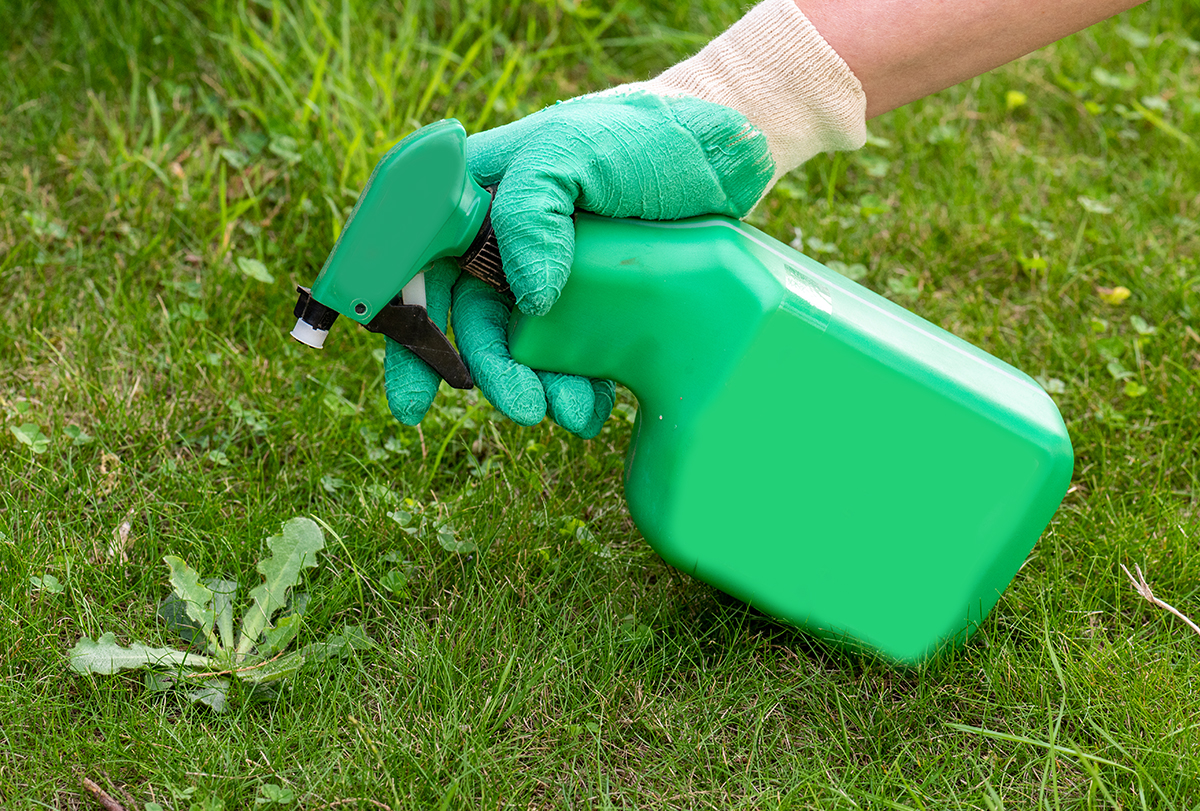
Despite your best efforts to keep weeds at bay, these pesky, persistent, and pernicious plants grow among purposefully planted vegetable patches and flowerbeds as well as garden pathways, waste areas, pots, and lawns.
As they grow faster than native plants and successfully compete for available soil nutrients, water, sunlight, and space, they can impact the growth of your plants and figure as one of the major threats to any garden setting. (1)
Of all the 250,000 species of plants known to man, only 3 percent or 80,000 possess the characteristics that can qualify them as weeds. While these rogue elements may serve certain interests such as providing organic matter, nectar for bees, and fodder for wildlife and stabilizing the soil, their demerits would still outweigh their merits in the eyes of any horticulture enthusiast.
Homemade Weed Killers
It is quite easy to whip up a nontoxic weed killer solution by blending a few natural ingredients that are often readily available at home. You would be surprised to know what something as commonplace as white vinegar, lemon juice, liquid dish soap, and Epsom salt can do to weed out your weedy troubles.
The acidity of the vinegar and lemon juice works to adjust water and soil pH and sucks out moisture from weeds or causes a foliar burn, eventually leading to their death.
This beneficial trait draws legitimacy from a study that highlighted the efficacy of an acid-based formula containing NaCl, citric acid, and wood vinegar in controlling broadleaf weeds through contact poisoning.
However, the said herbicidal mix was found to be rather ineffective against grasses. (2) This is often true of weed remedies, chemical or otherwise. You will find that mixes effective against dicots (plants with netted venation) are often not effective against monocots (plants with parallel venation).
Even salt is excellent at dehydrating the weeds, eventually causing their death. (3) It not only kills existing weeds but also prevents the growth of new ones in the same area.
An experimental study was conducted to examine the effectiveness of salt for weed management in jhum paddy in mid-hill conditions in the Eastern Himalayas. The researchers found that application of salt at the rate of 120 kg ha-1 resulted in significantly higher grain yield and higher weed control efficiency than three hand weeding. (4)
Additionally, the liquid dish soap will work as a surfactant, which means it will help reduce the surface tension that can cause the weed-killing concoction to bead on the leaves instead of being absorbed by the plant. (5)(6)
Here are 3 homemade weed killer recipes that are safe and effective.
Recipe #1: Vinegar, salt, and liquid dish soap homemade weed killer
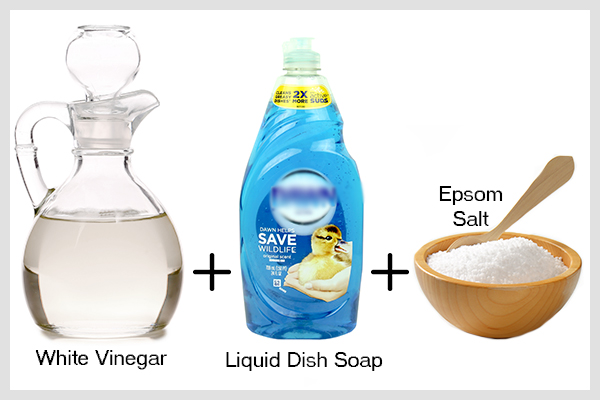
Things you’ll need:
- White vinegar – 1 gallon
- Liquid dish soap – 2 tablespoons
- Epsom salt – 1 cup
Steps:
- Take a pitcher and add 1 gallon of white vinegar into it.
- Add 2 tablespoons of liquid dish soap to it.
- Add 1 cup of Epsom salt.
- Stir well to blend the three ingredients.
- Transfer the solution into a spray bottle, using a small funnel.
- This homemade weed killer using vinegar, liquid dish soap, and Epsom salt is ready to use.
Recipe #2: Salt and water homemade weed killer
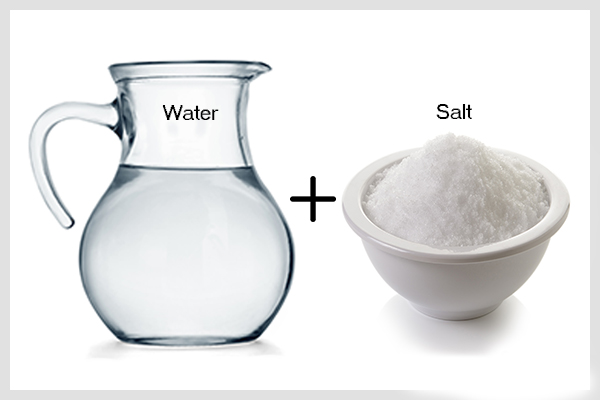
Things you’ll need:
- Salt – ½ cup
- Water – 1 cup
Steps:
- In a bowl, put ½ cup of table salt.
- Add 1 cup of lukewarm water.
- Stir properly until the salt dissolves completely.
- Transfer the saline solution in a spray bottle, using a small funnel.
- This salt and water homemade weed killer for spot treating weeds in your garden is ready.
Recipe #3: Lemon juice and dish soap homemade weed killer
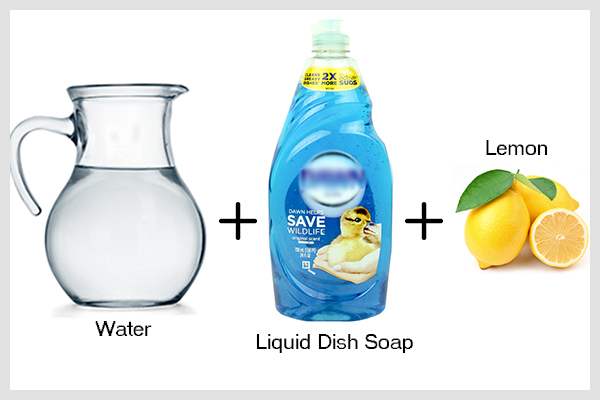
Things you’ll need:
- Lemon – ½
- Liquid dish soap – 1½ tablespoons
- Water – 1 cup in a spray bottle
Steps:
- Pour 1 cup of water in a spray bottle.
- Add 1½ tablespoons of liquid dish soap in a spray bottle.
- Squeeze the juice of half a lemon into the bottle.
- Put the nozzle on the spray bottle and give it a nice shake to help the ingredients mix properly.
- This lemon juice and liquid dish soap homemade weed killer is ready to keep your garden free from weeds.
How to use the DIY homemade weed killers
You can use any of the above-mentioned DIY homemade week killer recipes to keep your garden free from weeds.
These remedies fare best when used under bright and sunny weather conditions. The sun always assists in dehydrating or burning of plant tissues. Check the weather forecast to make sure that the day you have chosen will be a sunny one and there will be no rain for a couple of days.
All you need to do is shake the bottle properly and then spray any of the homemade solutions on the leaves and stems of the weeds, but not the soil or the crops you desire to keep. A single spray will help dry out the weeds in a week’s time.
Repeat the process if remnants of the weed continue to persist. So long as the weed is not completely eliminated, there’s always the risk of regrowth. After pulling some of the larger weeds, the spray can be used to kill off underground growth by simply spraying the remaining stump or root.
What Are the Key Characteristics of Weeds?
It’s extremely hard to tell weeds and regular crop plants apart as far as size, form, and morphological and physiological features are concerned.
However, there are certain characteristics specific to weeds that account for their reputation as enemies of crops. (1)
- Unlike most plants, weeds are quite resilient and can survive in even the most adverse conditions.
- These unwanted plants sprout just about anywhere and can be detrimental to other plants and poisonous for some grazing animals in the estate.
- Some weeds spread more rampantly than others. For instance, weeds such as doob can ravage a field by speedy vegetative reproduction even under adverse conditions.
- Some weed species can regrow from root and stem fragments left behind in the soil, making them almost impossible to get rid of by hand.
- Weeds are strong competitors and usually tend to have an upper hand over planted crops. They have the ability to outcompete most intentionally planted horticultural crops. Weeds sprout earlier and spread faster, hogging sunlight, moisture, and soil nutrients. If left unchecked, weeds can strangle the growth of other plants.
- They are usually well endowed with seeds, which have a high germination rate (this means many of the seeds produced will sprout, even in adverse conditions), that sprout earlier and grow faster than most horticultural crops. Given their formidable reproductive capacity, it can be quite difficult to control and sometimes even impossible to eradicate some weeds completely.
- The weed seeds remain viable despite being buried deep into the soil. They can also lie dormant for a long time. These seeds germinate and the sapling shoots through the layers of soil into a full-bloom weed.
- These undesirable plants may exhibit special features such as hooks, prickly spines, wings, and sticky hair-like growths, which allow for their easy dissemination across long distances and difficult fruit removal as an eradication method.
What Makes Weed a Nuisance?
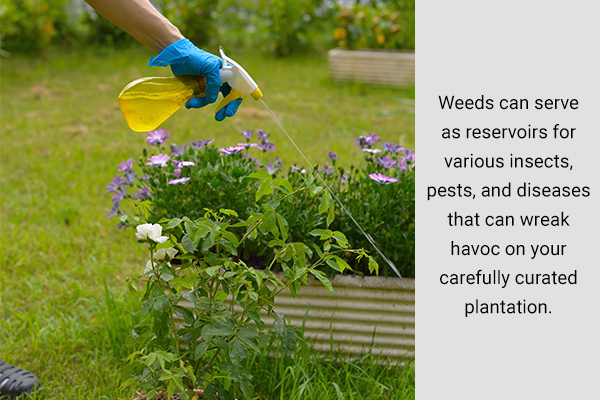
Despite diligent trimming and pruning, your garden may not be safe from a potential weed attack. Not only do they put a damper on your concerted garden grooming efforts, but weeds can also damage your carefully planted and often expensive plants.
Similarly, they are a menace for agricultural plantations. Weeds can contaminate harvested crops just as easily as they can inhibit the growth of regular plants. Weeds can invade via the wind, via underground roots or tubers, and even via store-bought soil mix.
Here are the other nuisances of weeds:
- Not only do weeds compete with your plants for nutrients in the soil, but they also compete for sunlight and water.
- Weeds can also jeopardize the growth of your precious plantations as they are often carriers of diseases that can easily be transmitted to other plants via insects, wind, and pruners.
- Ridding a field of weeds requires extensive labor and tillage operations, both of which greatly increase the overall cost of cultivation and simultaneously reduce the margin of net profit. Even in a home garden, weeds can cost the gardener enjoyment, as managing them can take up so much time.
- Some weeds even contain certain harmful phytotoxins that give off secretions that negatively impact the growth of many crop plants.
- Weeds can serve as reservoirs for various insects, pests, and diseases that can wreak havoc on your carefully curated plantation. Moreover, the weed themselves can prey upon other relatively fragile plants as alternate hosts.
- Weeds can bring down the overall quality of field harvest as well, as the undesirable weed seeds can get easily mixed up with the main produce.
- Weeds can cut off air passage between cultivated plants and lock too much moisture into the soil, triggering the spread of disease.
- Weeds adversely impact the irrigation efficiency by obstructing proper drainage, curbing the flow of water in irrigation and field channels. As a result, you may incur additional losses on account of unnecessary seepage and overflowing.
- Weeds accelerate the breakdown of farm implements and can render them useless unless they are properly sharpened, mended, or maintained.
- Agricultural lands that are perennially infested with weeds such as kans tend to fetch less price in the real estate market as they call for added expenditure on labor and machinery.
Additional Tips
- You need to spray the homemade weed killers on the leaves and stems of the weeds only.
- Avoid spraying the solution on the soil as it can kill your valuable plants along with the weeds.
- Once done, you can store the leftover homemade weed killers in a dark and cool place and use them as needed.
Final Word
Weeds tend to grow even in the best kept areas of foliage, be it your garden, lawn, or farm. And even though there are many different types of weed killers available in the market, most of them contain harsh chemicals that can damage your plants as well as the fertility of the land in the long run.
Pulling weeds by hand is always the most reliable solution but not always a practical one. So, to keep your garden free from weeds, you can look for natural options, which are generally less harmful to the environment than chemical ones.
- Was this article helpful?
- YES, THANKS!NOT REALLY


